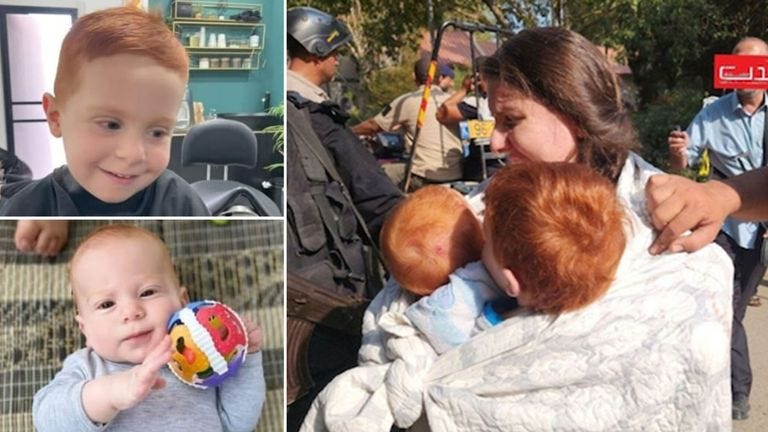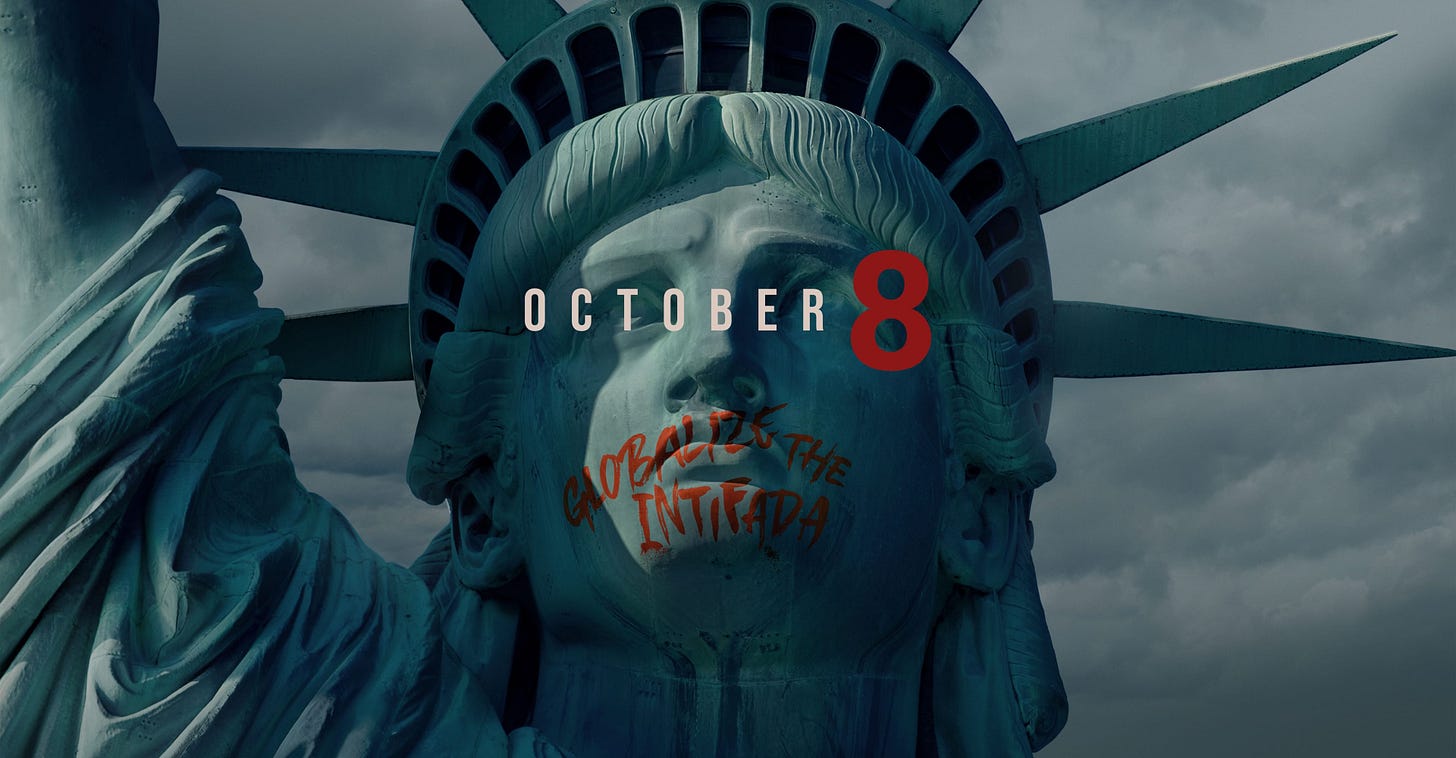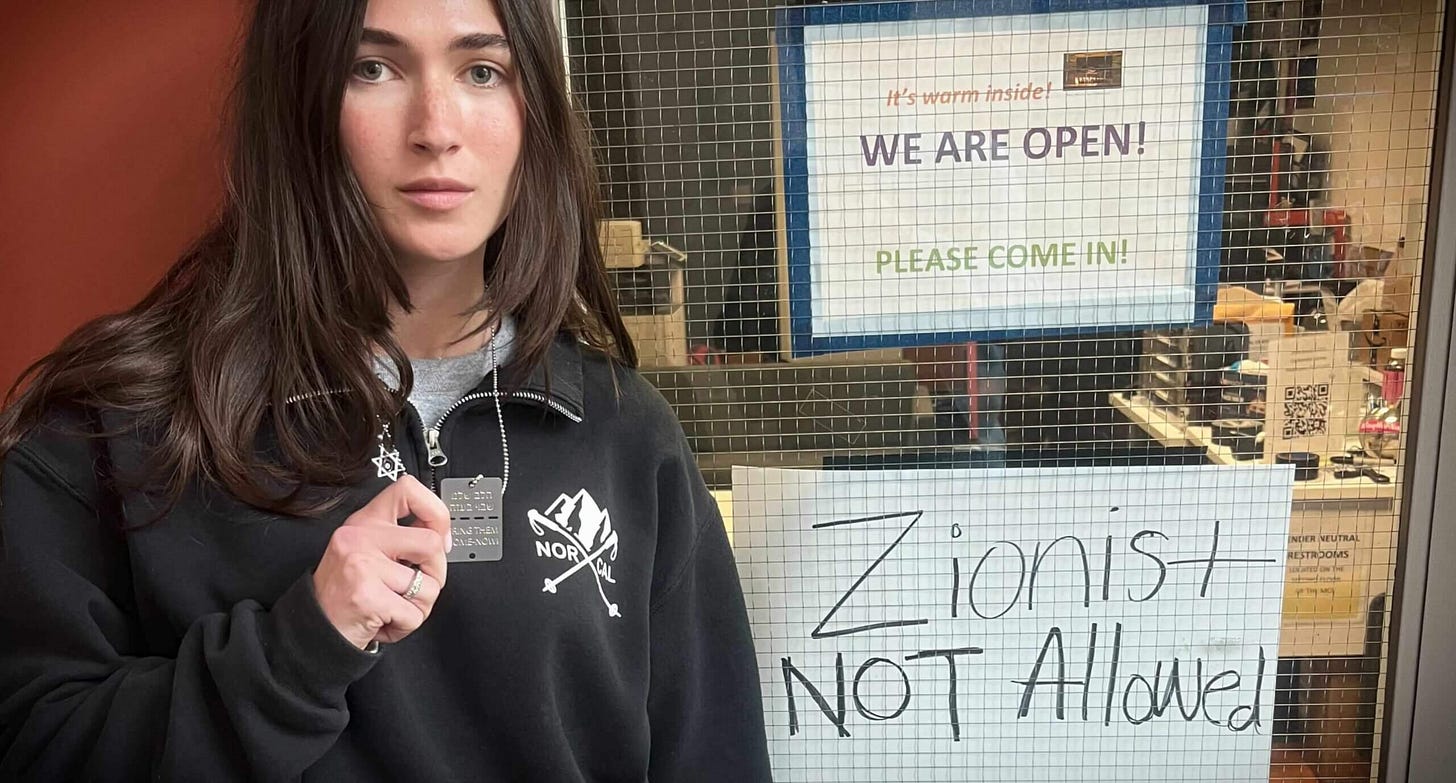Popcorn and Jihadist Paragliders
Documentaries like "October 8" are important, but they can only really make an impact outside of our echo chambers.
Please consider supporting our mission to help everyone better understand and become smarter about the Jewish world. A gift of any amount helps keep our platform free of advertising and accessible to all.
This is a guest essay written by Adam Hummel, a lawyer in Toronto.
You can also listen to the podcast version of this essay on Apple Podcasts, YouTube Music, YouTube, and Spotify.
On Sunday evening, I was privileged to see a screening of the new film, “October 8.”
Everything you have probably heard or read about it is accurate. It is an excellent documentary that does an exceptional job distilling so much of what we have collectively experienced over the last 18 months, into just 100 minutes.
Walking out, my brother and I remarked to each other how it could easily have been a six-to-10-part Netflix series, with each episode expanding on one of the themes explored in the movie, as there has just been so much that has transpired in the last 540-plus days: antisemitism on campus, ignoring the plight of the hostages, tearing down hostage posters, the silence of UN Women, the silence of Hollywood, the DEI hypocrisy, foreign funding of encampment movements, and Hamas/Muslim Brotherhood efforts to embed themselves in American culture.
This doesn’t even mention what actually happened on October 7th itself.
Nevertheless, in the relatively short run time, so much ground was covered, and we were also privileged to hear from the director, Wendy Sachs, who has done God’s work putting this documentary together and getting it out.
The documentary features many names who have become a part of our daily lives: Ritchie Torres, Bari Weiss, Dan Senor, Michael Rapaport, Noa Tishby, et al — and takes the audience through the aftermath of the October 7th attacks in Israel.
As the film poster notes, it focuses on “the fight for the soul of America” (not Canada), and undertakes the heroic deed of documenting the post-October 7th lives of some incredibly brave college students who have fought on the front lines on a war for civilization on American soil: Noa Fay, Talia Khan, and Tessa Veksler, among others.
I went through some crazy stuff on campus 20 years ago at York University in Toronto, but simply cannot fathom what these heroic Jewish students are facing today, all while trying to simply get an education.
All that being said, I highly recommend it. You should go see it too.
Though the movie itself was well done, it was the overall experience that left me — I don’t know the right word — unsettled? Uncomfortable?
This is what I mean: There wasn’t one part of the event that was normal. It was all just … weird.
I shlepped all the way from Thornhill Woods to Midtown Toronto to take part in what has become, in some parts, the post-October 7th spectacle. A night out, a place where I’ve often gone to see a movie after a nice dinner and a drink. I walked into the theatre, and immediately grew resentful of the other non-October-8-documentary-moviegoers who were there seeing something else.
I walked past people coming out of other movies — “A Working Man,” “Death of a Unicorn,” “Captain America” — whereas I was going to see a movie about the nightmare that has been our collective lives for the last 500-plus days. For these others, their Sunday evening was a night of escapism. For us, it was a night of entrance-ism.
We were there to go into the horror of the last year and a half. That started all that time ago with the worst massacre of our people since the Holocaust, that we have been living every day, unable to dispel from our minds, our thoughts, our hearts.
I thought: Why must I live the burdened life of a Jew, saddled with the heartache of this moment, while my fellow citizens spend a Sunday evening at the movies, laughing, enjoying their snacks?
I sat down and, with the popcorn provided by the event hosts, began to munch away. I love popcorn, and it is synonymous with any movie-going experience. The lights went down, the movie started, and my hand instinctively went to the popcorn bag.
It took only about three minutes — when a highlight reel of October 7th footage, footage from the actual day of the attack, flashed across the screen — that I realized that it was just so wrong or weird or inappropriate to be eating popcorn at this moment.
Here was a brief video of Shiri Bibas holding her young sons Kfir and Ariel, being escorted to their deaths by Hamas militants, and I could just taste the buttery-saltiness of popcorn on my lips. The videos of Hamas gunmen roaming the streets of Israeli towns shooting at cars driving past, of young Israelis running through the Kibbutz Re’im field trying to escape the carnage, of demonic paragliders slicing through Israeli airspace to kill Jews.
I stopped, and put the popcorn down. How could I eat popcorn while watching a montage of a video depicting the massacre of my people? In 1944, did North Americans go watch movies about the Holocaust with a greasy bag of popcorn in their laps?
I hope not.

Only the first seven minutes of the documentary detail the actual events of October 7th. The rest is about the days since, but the weird taste in my mouth (not the popcorn) remained.
How were we sitting there watching a movie about the modern-day plight of our people, popcorn in hand? How is this normal, and how acclimated have we become over the last 18 months to a situation so utterly abnormal?
And yes, if you’re wondering, I picked up and kept eating my popcorn. My I’m-Jewish-don’t-waste-food identity kicked into high gear, along with the emotions.
Above, I used the word “spectacle” to refer to much of the post-October 7th environment here in Canada. It is something I struggle with a lot, and I have a hard time writing about it because I don’t want to sound judgmental, preachy, or hypocritical. I may come off as all three today, but I don’t intend to.
Here, in Canada, there is a culture that has now grown around October 7th and the aftermath (to the extent that there is definable aftermath, as it is still very much ongoing). It is this culture where we wake up in the morning, put on our dog tags or yellow ribbons, go on Sundays to the rallies, attend these events (often, with cocktail or hors d’oeuvre in hand), and pay homage to the soldiers or hostages, and then move on to the next … thing.
It is not that we don’t have them in our hearts and minds all the time, and we are certainly well-intentioned, but it is just weird, and I don’t know the way around it.
“Did you get tickets to the October 8 movie?” “Are you going to the Nova exhibit?” “Are you going to see Douglas Murray?” “(Insert group name here) is having (insert name of influencer here) tomorrow evening. Are you going?”
I have these conversations more frequently than I’d like, and yes, I try to get tickets to it all.
Events like these, and documentaries like these, are important. We need to know what is going on. We need to be constantly reminded. We need to be up-to-date, which is why the podcasts and newspaper articles and, yes, even the exceptional posts found at Catch are necessary. And everyone going to and organizing these events are well-intentioned, and doing important — crazy important — work. No question.
But there is just something … uncomfortable … when we take a step back and realize some of the ways that we are going about engaging with the post-October 7th events. There are the t-shirts, the swag, the books and book clubs, the jewellery, and the things we all must do — whether we feel like we must do it or not — and it is all just, well, overwhelming. And something I’ve been thinking about a lot.
These thoughts are all probably an extension of a discomfort I felt when I was in Israel a few weeks ago. I visited the sites around the Gaza envelope as a tourist myself, but found it difficult to fathom that these sites had become tourist attractions. The Nova festival massacre site is now, I understand, the most visited place in Israel, and yes this is so important.
The families of the victims themselves have set up memorials to their children, brothers, sisters, parents, so that people can come and properly pay their respects, and remember the dead.
But it is nevertheless strange that tour buses pull into the parking lot constantly, with tourists hopping on and off, when we still don’t know the full extent of what happened there. When people kidnapped are still in Gaza — and we don’t know if they are dead or alive. When their DNA still stains the dust on the ground where we walk.
It is different than visiting the Memorial and Museum at Auschwitz-Birkenau. In Israel, it is still … alive. And though the vast majority of those who come to visit these sites filled with Jewish blood are doing so with the best of intentions, there are others who are there to fill their Instagram feeds, who smile when they take their selfie, and who display a strange cognitive dissonance either on account of ignorance or habit. I’m not sure. (I warned you about the judginess).
As you can no doubt tell, I’m confused. And honestly, I hope you are too. No one should be comfortable with anything happening today. The post-October 7th story has still not been written, and even the best prognosticators cannot tell us if we are in the beginning, middle, or end of the days after October 7th.
I’m sure there is also a excellent rebuttal somewhere out there to what I am writing, and I’d be happy to read it if someone wants to write it. I hope you do. I just feel though that if I’m feeling it, others may too. It is important to find support at times like these.
The only criticism I have of the documentary is the effort to end on a high note. Yes, that’s a thing we all like to see. We want things to end on a positive note, on something hopeful, and the movie ends with a note about the fact that we have found non-Jewish allies (thank God for Ritchie Torres, Douglas Murray, and Mosab Hassan Yousef), and that all is not yet lost on campus.
But let’s face it: Things are pretty grim at the moment, regardless of who is in the White House, how battered Hamas may be, or whatever other positive strides we may feel have been taken in the past few months. Fifty-nine hostages remain in captivity, the war is still raging, the future is terribly unclear. That’s not to say I would have ended the movie any differently, but let’s not kid ourselves: More than 540 days ago, the doors opened to a dark new world.
However, in an effort to end on a productive note myself, this is how I will end this tragic post: Go see the movie when it comes out, but don’t go see it with your spouse or partner or sibling or best friend. Go see it with someone who would otherwise not go see it: an unengaged member of the Jewish community, a non-Jew, a colleague from the cubicle/office over from you.
Someone who needs to learn something. Someone who would benefit from a reminder of what the Jewish community in the Diaspora has gone through over the past 18 months. Buy them a ticket. Hell, even buy them a bucket of popcorn and a Coke Zero. But take them to see it. They need to see it. Not you.
Documentaries like this are important, since they preserve a memory and maintain an historical record, but they can only really make an impact outside of our echo chambers.
We are not allowed to criticize others for choosing to see “Captain America” instead of this, but we can buy them a ticket, ask them to come along, and have a coffee with them afterwards to debrief, answer their questions, and thank them for spending the night sharing in our grief with us.




The only adequate response and the only adequate memorial to October 7 will be the declaration of Israeli sovereignty over Gaza, Judea and Samaria and the population of these areas by Jews en masse, many of whom will come from North America. As for the "Palestinians" in these areas they will be locked down for fifty years, free to leave whenever they want.
You captured so much of what is going on in our heads and in our lives these days, those of us in N. America, and you did it with both personal humility and respect for the victims. I have avoided watching any footage of what happened on Oct. 7 because I am a wimp. Just reading about it robs me of sleep and threatens my mental stability, so I admire your courage to face the carnage and to wrestle with your own reaction to October 7th and everything that has happened since. I had the same surreal reaction at Auschwitz-Birkenau. There was an obscenity about its having become a tourist attraction, an exercise to stimulate the Polish economy. I am still not sure whether my presence there was a desecration or not. When you describe our attempts to ‘signal’ our support of the hostages with our attendance at rallies and events, our dogtags and yellow ribbons, I am reminded of the signaling of the other side with their encampments, flags and kefiyahs. Having taken an abrupt political right turn at the ripe old age of 77, I find so many of my Jewish friends still face more to the left. My otherwise revered and adored Toronto friend, the late Tony Wallis, used to embarrass us with his rightwing attitudes about Israel’s security. I am glad he didn’t live long enough to see how right he was, and I am sad that I rolled my eyes in such complete naiveté.